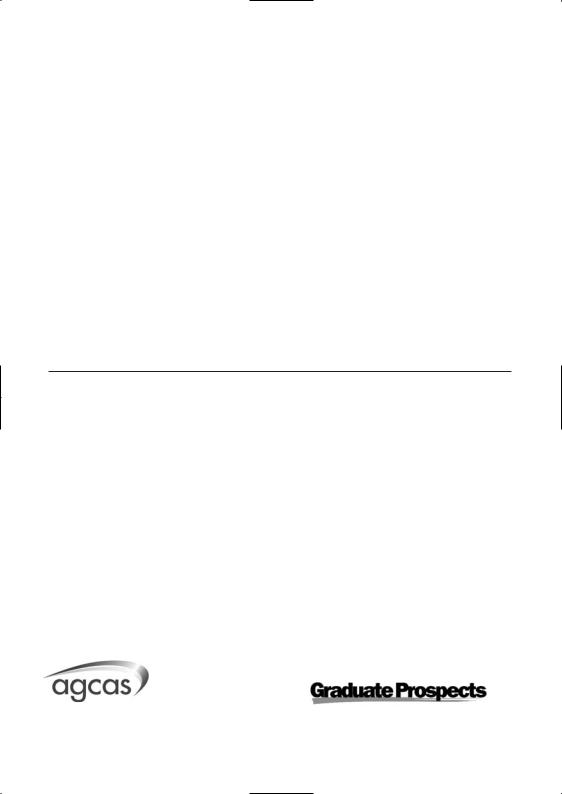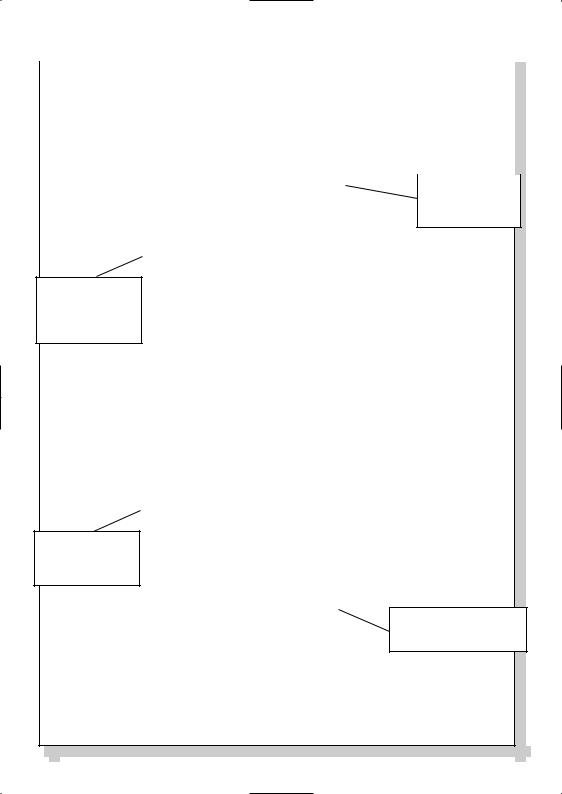
Материалы по написанию CV / Making_Applications_2005
.pdf
making applications
Special Interest Series 2005

AGCAS PUBLICATIONS
SECTOR BRIEFINGS
Find these in Explore job sectors on prospects.ac.uk/links/SectorBs
Advertising and PR
Broadcast, Film, Video and Interactive Media
City Markets
Construction
Cultural
Education
Engineering
Environmental, Food Chain and Rural
Fashion and Textile
Financial Services
Food and Drink
Health
Hospitality
Information Technology
Legal
Local, Regional and National Government
Manufacturing
Oil, Gas and Petroleum
Professional, Financial and Accounting Services
Publishing
Retail
Science
Small and Medium-sized Enterprises (SMEs)
Social Care
Sport and Leisure
Tourism
Transport
Voluntary
SPECIAL INTEREST SERIES
Also available on prospects.ac.uk
Beyond Nine to five - Flexible Working
Careers and Further Study for International Students
Going for Interviews
Job Seeking Strategies
Making Applications
Mature Students - The Way Forward
New Directions - Changing or Leaving Your Course
Postgraduate Study & Research
Self-employment
Using Languages
Working Abroad
Working in Europe - First Steps
Your Degree... What Next?
Your Foundation Degree... What Next?
Your HND... What Next?
Your Masters... What Next?
Your PhD... What Next?
OCCUPATIONAL PROFILES
Details for over 400 types of jobs
Also available on prospects.ac.uk/links/Occupations
OPTIONS
Ideas of what you can do with your subject of study
Also available on prospects.ac.uk/links/Options
Available in your HE Careers Service or Order online at www.prospects.ac.uk/links/OrderPublics

Contents
Making Applications
1 |
Where to begin 3 |
4 |
Covering letters 16 |
|
Where to apply 3 |
|
Content 16 |
|
When to apply 3 |
|
Style 16 |
|
How to apply 4 |
5 |
Completing application |
2 |
What do employers look |
|
forms 19 |
|
for? 4 |
|
Approaching difficult questions 20 |
|
Transferable skills 4 |
|
Tips for online applications 21 |
|
|
|
|
3 |
Presenting the evidence 5 |
6 |
Applications FAQs 21 |
Putting together an effective CV 5 |
7 |
What makes an effective |
|
|
Content 5 |
|
application? 23 |
|
Layout 6 |
8 |
Information sources 24 |
|
Styles of CV 7 |
||
|
|
|
Sources of help 24
An example of a chronological CV 8
Bibliography 24
An example of a skills-based CV 10
Websites 25
An example of a targeted CV 12
Addresses 25
An example of an academic CV 14
1

Published autumn 2005
To be revised autumn 2007
The writers of the Special Interest Series are members of the Association of Graduate Careers Advisory Services (AGCAS). These Special Interest Series are edited by the Information Development Department (IDD) of
Graduate Prospects and distributed by Graduate Prospects. Full editorial control is exercised by AGCAS.
Although every effort is made to ensure that the information contained in this booklet is accurate and is as up-to-date as possible, readers should check with the appropriate organisation for the latest information. AGCAS can accept no responsibility for ensuring that the accuracy is absolute.
Millennium House 30 Junction Road Sheffield S11 8XB www.agcas.org.uk
©Copyright of or licensed to AGCAS No part of this publication may be copied or reproduced, stored in a retrieval system or transmitted in any form or by any means electronic, mechanical, photocopy, recording or otherwise without the prior permission of the publisher.
Prospects House, Booth Street East,
Manchester M13 9EP
Tel: 0161 277 5200
www.prospects.ac.uk
2

1 Where to begin
It can be tempting to apply to as many organisations as possible when looking for graduate jobs. Mailing many copies of your CV to a list of the biggest recruiters is not unheard of - it’s also not a good idea! Although you will reach more potential recruiters, you may not be giving them your intended impression of you and could do more harm than good.
Making a good application involves much more than updating your existing CV with your expected 2:1 and your latest part-time job. Graduate applications need to present more than just a picture of your life to date. They need to demonstrate that your career aspirations are suited to the job, show that you know what the employer is looking for and that you can market your relevant skills and experiences accordingly. This means prioritising the information, removing old sections, planning an effective layout, presenting an accurate document and sending it with a covering letter that shows a real understanding of why you are attracted to that organisation in particular. Doing this well, for over a 100 applications, is no mean feat.
Increasingly, companies use online application forms to select applicants. The level of targeted information requested on these forms is an indication of what is also expected from a quality CV and covering letter. Applications can take up to three hours to complete effectively.
WHERE TO APPLY
If you are unclear of a precise job area at this stage, it can be useful to consider what you would like from a career and your future employer when considering to whom you should apply. If the organisation offers what you are looking for, it can help you to demonstrate why you would make a good candidate for the job in question, the relevance of your previous experiences and how you would fit into the culture of the organisation.
If you would like help choosing careers and organisations, the following could be useful:
•Interactive tools like Prospects Planner
(www.prospects.ac.uk/links/pplanner) can suggest careers that might suit you.
•Meeting with a careers adviser - useful for identifying your preferences and career goals.
•Attending sessions put on by the careers
service, careers fairs and company presentations to understand what careers involve, how employers differ and what employers want.
•Talking to family, friends and current employers about your strengths, skills and the kind of work that would suit you best.
•Meetings with people doing the work that you are interested in - build your network at employer-run career sessions or using any contacts.
It is difficult to say how many organisations you should apply to - how long is a piece of string? For some individuals it may be between five to ten applications, for others it will be more. Your other commitments may steer this. Try not to compromise on the quality of each individual application.
WHEN TO APPLY
Increasingly, companies with a large number of vacancies operate year-round recruitment drives – you can apply to them at any time of year. Other organisations tend to fill their vacancies as the year progresses so applying early is still advisable.
Recruitment overview:
•October - November - major recruiters advertise in career directories, such as Prospects Directory, attend fairs
(www.prospects.ac.uk/links/careerfairs) and give presentations. Some early closing dates around this time.
•December - many closing dates with the larger graduate schemes are just before Christmas or at the end of December.
•January - May - closing dates continue during this time, probably including smaller companies, and organisations with fewer positions.
•June - summer graduate recruitment fairs, companies with outstanding vacancies and those targeting new graduates.
Although this is just a rough guide, it can provide an indication of when closing dates may be common. Using vacancy bulletins and websites at your careers service can keep you up to date with the latest opportunities and forthcoming closing dates. In addition, Prospects Finalist and Prospects Directory are national job publications aimed at finalists or recent graduates, available free from your careers service.
3

For details of where more specialist positions are advertised, or how to make speculative applications to those organisations that rarely advertise positions, take a look at the AGCAS information booklet Job Seeking Strategies.
Alternatively, ask your careers service about creative job searching. If you struggle to find positions advertised in your preferred career area, there may still be opportunities, you may just be expected to go about applying in a different way.
Some students choose to wait until after graduation before applying. This is acceptable and many recruiters accept applications within three years of graduation for graduate schemes.
HOW TO APPLY
The message here is simple - follow the employer’s instructions! If an employer asks for completion of their online form, then that is what they would like. If you are unclear about the application procedure, you should contact the employer by phone or e- mail for further clarification.
You can target appropriate employers by sending speculative applications. You should send a CV and tailored covering letter indicating the kind of work being sought and the reasons for applying to that employer.
2 What do employers look for?
Employers look for evidence that you have the skills and qualities needed to perform well in that role. Depending on the vacancy, the recruiter could be looking for specific qualifications, experience or specialist skills, which indicate levels of motivation and competence and enable you to perform well. These competencies are particularly common for the major graduate employers who are often looking for your potential to develop, rather than your existing knowledge.
TRANSFERABLE SKILLS
The competencies or transferable skills that are particularly popular with graduate recruiters include:
•communication - ability to communicate orally, in writing or via electronic means in a manner appropriate to the audience;
•teamwork - being a constructive team member, contributing practically to the success of the team;
•leadership - being able to motivate and encourage others, whilst taking the lead;
•initiative - ability to see opportunities and to set and achieve goals;
•problem solving - thinking things through in a logical way in order to determine key issues. Creative thinking is also useful;
•flexibility/adaptability - ability to handle change and adapt to new situations;
•self-awareness - knowing your strengths and skills and having the confidence to put these across;
•commitment/motivation - having energy and enthusiasm in pursuing projects;
•interpersonal skills - ability to relate well to others and to establish good working relationships;
•numeracy - competence and understanding of numerical data, statistics and graphs.
Additionally, private sector employers like to see that applicants have some commercial awareness - have an insight into how firms operate, what is happening in the business world and the impact this could have on their organisation.
For further information on competencies, refer to What do Graduates Do? Employers often have set criteria they are looking for when selecting applicants. These could be laid out clearly in the person specification for the job or be identifiable from the job description, vacancy advertisement or organisation’s web pages.
Company statements can provide a useful indication:
‘You’ll need to be confident, creative and qualityfocused…a versatile, quick-thinking and businessminded individual…someone who can set and meet demanding targets’.
(John Lewis Partnership Graduate Programme)
4

Alternatively, if there is little information about the role, you could draw up your own. The job profiles in AGCAS Occupational Profiles
(www.prospects.ac.uk/links/Occupations) have useful sections on the skills and qualities usually required for entry into particular careers. You can also pick up copies of these occupational profiles from your careers service.
Uncovering the person specification for a job can also be a useful way to narrow down careers and potential employers. After closer investigation, you may decide that this is not the career/employer for you.
PRESENTING THE EVIDENCE
Your primary concern should be to present evidence of the skills and qualities that the employer is seeking. This could be in the form of your academic projects and achievements, responsibilities during work experience or voluntary activities, tasks in societies or management of sporting activities. The key is to match the
evidence in your application to what the employer wants. Recruiters want to read about the skills/qualities that are of interest to them and their selection criteria.
When examining your past involvements more closely, perhaps consider:
•What is it exactly that you have done?
•What were you responsible for?
•What were the outcomes?
•How did you achieve success?
•Is there evidence of ‘how’ you have demonstrated relevant skills?
Although it is important to be concise, just stating that you have a list of skills is not enough. Where is the evidence? Employers cannot simply take your word for it.
Thinking about how to demonstrate your responsibilities can also be a challenge. Focus upon active verbs. The descriptors of responsibilities and language suggestions in chapter 7 ‘What makes an effective application?’ may help.
3 Putting together an effective CV
Although the term ‘curriculum vitae’ literally means ‘course of life’, your CV is about much more. In addition to outlining your life and experiences to date, your CV is a marketing tool to demonstrate your suitability for the job in question. Prospective employers approach CVs from the perspective of:
•Does this CV demonstrate evidence of the skills and qualities I am looking for?
•Does this individual stand out from other applicants?
In the US, the term ‘résumé’ is usually used to distinguish this more marketed document from an academically focused biography, although in the UK the terms are more interchangeable. Take a look at chapter 6 ‘Applications FAQs’ for more information about country variations in applications.
CONTENT
The way you present information on your CV is relatively flexible and will depend on what you have to offer. However, it is generally recognised that all CVs tend to include the following sections.
Personal details
Keep this section brief, no more than a quarter of a page. Ensure you are easily contactable at the address given and if necessary include termtime/home addresses with dates for availability at each. E-mail addresses are useful. Choose one that your mother would approve of!
In or out?
•Date of birth is usual but not mandatory.
•Nationality is not mandatory but can be useful, particularly to clarify your ability to work in a country. International students may wish to use this section to clarify their work permit status – see our example chronological CV. Although some international students choose not to include nationality on a CV, some UK employers do not recruit non-EU nationals who need work permits and may even screen out applicants at a later stage of selection if not previously disclosed.
•Marital status, gender and health status are not included unless specifically and legitimately requested for this post.
5

Personal profile/career objective
If you use a profile, keep it brief at three or four lines maximum. Use it to demonstrate your career focus/current aims and perhaps evidence of two or three main strengths and where they were developed. See our example CVs for details. Avoid generic skills statements like ‘good communicator, team worker with strong analytical skills’.
Profiles are optional and the information could alternatively be adequately covered in your covering letter.
Education
Usually stated in reverse chronological order, with your most recent experiences first, back to your secondary level education. Include dates, the name of the institution and town. Full addresses are not required. Integrate your education and qualifications into one section. Think about the relevance of the information. Summarise GCSEs but market your later education more fully and using language that an employer will be familiar with. Suggestions include a list of relevant modules, information about projects and dissertations undertaken, average grades to date or predicted result and/or skills developed. For example:
•data analysis, interpreting statistical information and the ability to use relevant computer packages;
•teamworking, communication and presentation skills developed during group projects;
•creativity, initiative and design ability for artistic studies.
It can be tempting to try to cover up a poor grade by not mentioning it at all but there may be ways of limiting the damage on paper. If you are unsure about how to approach this, consult your careers adviser.
Experience
All experiences count, whether paid, voluntary or shadowing. Aim for reverse chronological order with rough dates to illustrate how long you were there. Focus on your responsibilities, achievements in the role and illustrations of where skills were used or developed. Try to give yourself a job title and use terminology relevant to the post you are applying for or that shows commercial awareness.
You may wish to create a separate section for experiences particularly relevant to the post you are applying for. Example headers include ‘relevant experience’, ‘technical experience’ or ‘legal
experience’. Similarly, as your experiences grow, it may be appropriate to summarise some experiences together.
An example would be:
Summer 2004 A variety of customer service roles including bar work, waitressing and telesales. Developed an awareness of customer relationship management and improved my influencing skills when working with challenging clients under pressure.
Positions of responsibility/achievements/ interests
These are all relevant sections to include and can be used to demonstrate that you are motivated to pursue other activities, have an interest in a relevant career and take the initiative to develop your involvements and skills. Again, try to focus upon recent achievements and what your contributions were, skills developed and outcomes. Employers will not necessarily spend time trying to make sense of your experience.
Referees
Two referees are the norm, one academic and one work-related, or a character referee if allowed. Give their phone number and e-mail along with their title and full contact address. Always ask for their permission first and remember to keep them informed of your career aspirations and achievements to date. If a reference from your immediate manager is not possible, perhaps use someone else in the company. If using an international referee, perhaps confirm that a fax/e- mail in English is okay.
If you are running out of space, and not explicitly requested, it is acceptable to state ‘References available upon request’.
LAYOUT
Without realising it, your CV can send out many other messages about you. For example, the accuracy of spelling and grammar and the attention to detail of layout can convey messages about your motivation and professionalism. Care taken to target, interpret and prioritise your experiences can demonstrate effective written communication and decision-making.
CVs should be two pages maximum, unless for an academic research position. Single-sided, printed
6

on quality paper and with grammatical and spelling errors ousted, your CV should aim to reach the employer in pristine condition. Watch out for American spell-checks on PCs, they can catch you out.
Employers appreciate a concise writing style. Use relevant headings, short paragraphs and bullet points effectively to enable an employer to easily navigate the information on your CV. Employers typically don’t read everything and their first glance could be only a few seconds. A complicated CV may not get a second chance.
In the main, graphics and gimmicks are to be avoided. Using tables and charts can make a CV look cluttered and detract from the information given. Overall, try to use a consistent style and format and don’t overdo the underlining and capitals. Try a different or larger font for headings and use bold for emphasis. For some creative roles, an alternative approach may be appreciated but keep it original and professional.
STYLES OF CV
Particular CV styles can help to highlight your relevant strengths depending on your experiences to date. Many people find a combination of styles effective.
The chronological CV
This is the most familiar format, outlining your experiences in reverse chronological order with sections for education, experience and achievements. It is easy to organise and demonstrates how you have progressed over time. However, it may not be as suitable if you have changed jobs frequently, have disparate experiences or are looking to change career direction. (For an example of a chronological CV see pages 8 and 9.)
The skills-based CV
This CV focuses upon demonstrating evidence of relevant skills. Use relevant skill headings to present your evidence - educational and work experience descriptions are kept brief. This style of CV is more difficult to organise but, if you focus on the right skills, it can show you have considered the needs of the employer. (For an example of a skills-bassed CV see pages 10 and 11.)
The targeted CV
This CV style emphasises that you have evidence of the different types of experiences or
responsibilities for a particular post. Targeting your CV in this way can include bringing together relevant evidence from across your education, experience, skills and achievements and presenting it effectively with relevant headings. If you have a broad range of relevant experiences, a targeted CV may be more appropriate. (For an example of a targeted CV see pages 12 and 13.)
The academic CV
This type of targeted CV differs mainly in the degree of emphasis given to knowledge and academic achievements. For an academic or research career, appropriate headings could include:
•dissertation/research abstracts;
•research interests/areas of expertise;
•teaching/administrative experiences;
•publications, presentations or conferences attended;
•professional memberships;
•fellowships and awards.
(For an example of a chronological CV see pages 14 and 15.)
Remember that your research interests should be comprehensive to those outside your field but scholarly enough to interest fellow researchers. Lastly, try not to neglect your transferable skills and a professional layout. Academic employers still require individuals who are motivated team players, can manage projects, bring in funding and communicate concisely and professionally.
For further information on marketing a PhD effectively, see the AGCAS information booklet Your PhD... What Next? If you are a postgraduate who is not looking for an academic career, your CV should follow an alternative layout.
Electronic CVS
When submitting a CV online, be aware of who will see it. Is your formatting readable by all IT packages? Will an elaborate layout travel electronically? Will a generic CV template used by an online agency be sufficiently targeted to your preferred career? Some recruiters use scanning equipment for CVs submitted online so try to consider any key criteria or attributes that may be sought.
Try to establish the policy regarding the privacy of your personal details. Some people prefer just to submit an e-mail address or a hyperlink to their own website. There are also some bogus sites listing fictitious vacancies, which forward your CV to hundreds of employers. Look for established user protection with password controls.
7

An example of a chronological CV
MING SU (LILY) |
|
|
|
|
|
|
|
|
|
|
|
|
|
|
Term address (until 13/03/2005) |
Home address |
|
|
|
Flat 3, 104 Daisy Bank Road |
1042 Hong Qiau Road, |
|
|
|
Victoria Park, Manchester M14 6RP |
Hong Estate, |
|
|
|
Tel: 07958 765377 |
Shanghai, 6000872 CHINA |
|
|
|
|
|
|
|
|
DOB: 19/01/1984 |
|
|
|
|
E-mail: su.ming@student.manchester.ac.uk |
|
|
|
|
|
|
|
|
|
Nationality: Chinese (no work permit required for vacations) |
|
|
|
|
EDUCATION
2001 - 2005
Market your qualification - skills, modules, relevant experience gained
1998 - 2001
The University of Manchester, United Kingdom
BA (Hons) Accounting & Finance
Average grades: Year 1 - 68% Year 2 - 67% Expected result 2:1 Modules include: Financial accounting, Management accounting, Business information systems, Finance, Financial markets, Business economics
Skills developed: Independent project work has developed my analytical thought, numeracy and ability to manage projects effectively.
Regular group working in teams of 3-6 has improved my ability to build effective working relationships.
School of Pre-School Education, China
Diploma in Pre-School Education
Grade A* - This qualification is equivalent to A-level study
ACCOUNTING EXPERIENCE
June 2004 PricewaterhouseCoopers, London
Insight into Accountancy
Actively participated in this one-day seminar about accountancy careers and opportunities for graduates. Included practical group case studies and presentations and developed industry awareness.
Summer 2001
It is fine to separate out relevant work experience
Freshlands Accountants, Shanghai, China
Administrative Assistant
Provided effective administration support for a financial and human resource team of 5 individuals. Organised paperwork, provided frontline internal client support, effective minute-taking, stock ordering and diary management.
Achievements:
•Volunteered to provide IT training to other administration colleagues and inducted new members joining the team.
•Developed my understanding of financial administration and accounting practices and my skills in customer service, organisation and project
management.
OTHER WORK EXPERIENCE
2002 - 2004 Jabez Clegg
Bar Assistant/Supervisor
•Regularly responsible for the management of this busy student bar. Work in a team to manage tasks across the group on busy nights.
•Stock maintenance, dealing with difficult customers and providing ideas for theme nights with colleagues.
8
